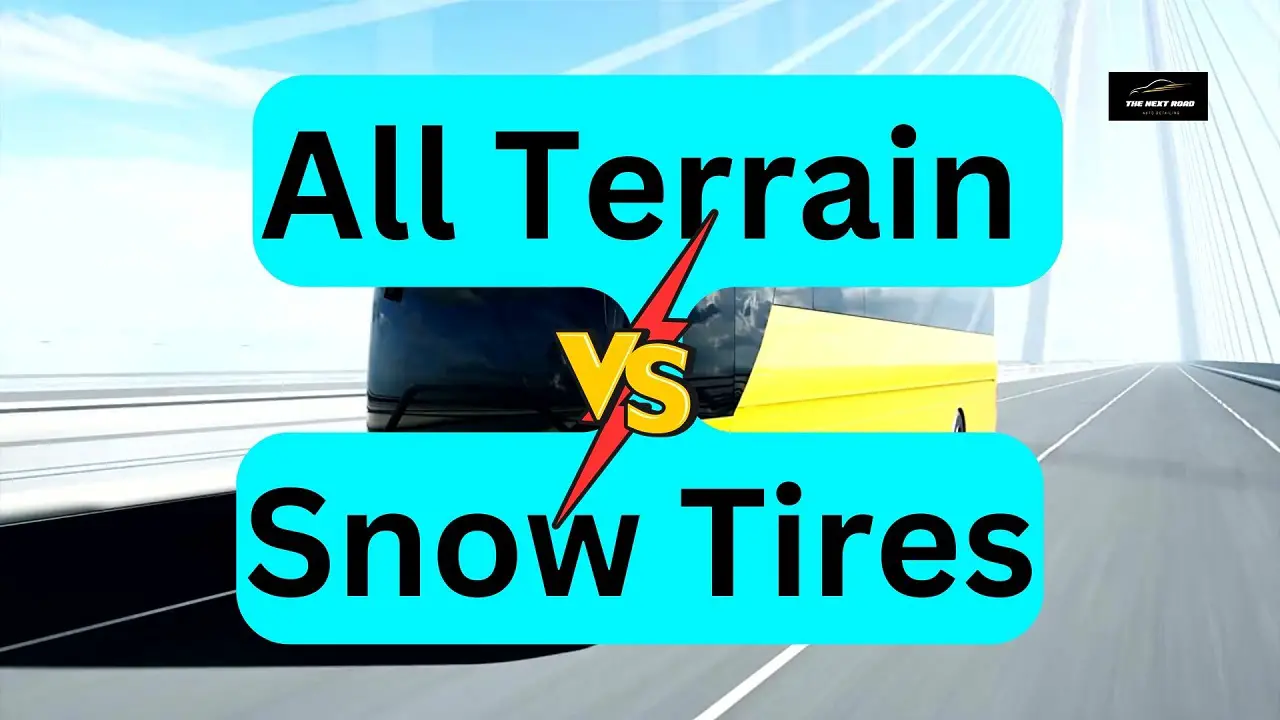Here we explore in details all terrain vs snow tires. Discover the best choice for your winter adventures. Make an informed decision right now. As the seasons change and the first snowflakes begin to gently blanket the earth, drivers everywhere are faced with an age-old question that goes beyond mere rubber and tread: all terrain vs snow tires?
Choosing between All Terrain vs Snow Tires? Learn key differences to enhance winter driving safety and performance. Here are in details:
All Terrain VS Snow Tires: A Detailed Comparison
All-Terrain Tires
Design: All-terrain tires provide good performance on road as well as off-road terrain such as mud, gravel as well as light snow. It are intended for use on a range of surfaces.
Tread Pattern: To give grip in challenging off-road conditions, these tires have an extreme tread design with greater voids.
Snow Performance: All-terrain tires weren’t developed especially for harsh winter conditions but they are capable of handling light snow and slush.
Temperature Range: They function perfectly in an assortment of climates, although in exceptionally cold weather, they might not offer as much traction as tires designed specifically for snowfall.
Pros and cons of All Terrain Tires
Pros
- Adaptable in both off-road and on-road circumstances.
- Long-lasting, able to tolerate harsh environments.
- Enhanced traction in snow, mud, and gravel.
- Comfortable ride on paved roads.
- Economic value, eliminates the need for two tire sets.
Cons
- Reduced fuel efficiency due to heavy construction.
- Increased noise level at higher speeds.
- Faster wear rate on pavement.
Related: All Season Tires VS All Weather Tires: Learn The Key Differences
Snow Tires (Winter Tires)
Design: It’s designed to perform very well in cold climates. Snow tires provide outstanding traction on ice & snowfall-covered roads.
Tread Pattern: To improve traction on snow and ice, the winter tires include deep treads with biting edges and spies.
Snow Performance: Compared to all-terrain tires, its give superior handling & braking in snow and ice because they are designed for driving in freezing temperatures.
Temperature Range: Even on slippery or slushy roads, winter tires retain their suppleness below freezing, guaranteeing optimal traction.
Pros and cons of Snow Tires
Pros
- Improved traction on snow/ice.
- Enhances safety in winter.
- Better braking on icy roads.
- Durable in cold weather.
- Optimized for winter conditions.
Cons
- Requires seasonal tire change.
- Faster wear in warm weather.
- Storage can be challenging.
- Higher upfront cost.
- May reduce fuel efficiency.

Key Differences
1. Goal: While snow tires are made specifically to operate best in extremely cold weather, On the other hand all-terrain tires are made to be versatile on a variety of terrains especially light snow.
2. Traction: Because of its special tread pattern as well as rubber substance, snow tires possess far higher traction on compacted snow and ice than all-terrain tires.
3. Temperature Sensitivity: Snow tires retain their traction in snowy circumstances where all-terrain tires may harden and become less useful. Snow tires are flexible at lower temperatures.
4. Road Conditions: Choosing specialized snow tires over all-terrain tires is advised for safer driving performance if you regularly drive in severe winter weather with plenty of snow or ice roads.
All-Terrain Tires vs. Snow Tires Price differences
All-terrain tires generally cost less than snow tires. Snow tires are designed specifically for winter conditions, typically making them more expensive than all-terrain tires.
Which is the best – all terrain or snow tires
The significance of selecting snow and all-terrain tires according to characteristics like tread pattern and rubber composition is covered in the text. Although versatile, all-terrain tires might not function well in the snow. Snow tires work best on ice roads, but they may not be as good on dry ones. When choosing a tire, one must consider driving conditions, terrain, and weather. Studying tire design and environmental factors is necessary to make the best selection in terms of safety and performance on various terrains.
We appreciate your reading of our content. Please share it.
The Next Road (thenextroad.com) is an affiliate of the Amazon Services LLC Associates Program, so you can access the Amazon marketplace when on this domain. We will earn a commission from your qualified purchases.